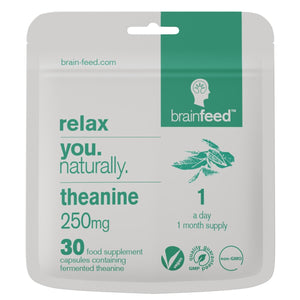L-theanine vs GABA: How to relax your brain quickly?
filter
L-theanine is a popular calming nutrient. Are l-theanine and GABA, the main chemical that helps your brain take a break to relax, connected? Let’s take a look at the GABA vs l-theanine list to determine which supplement works best for you.
GABA is the main chemical that helps your brain take a break to relax. It has widespread importance with its network covering 44% of your brain[1 Trusted Source 2002 - The Neuroscientist Research evaluation Book Review: GABA and Glutamate in the Human Brain ] . It’s found in plants and animals. Your gut microbes produce GABA for its use to relax muscles, heart health, and the immune system[2 Trusted Source 2018 - International Journal of Clinical Pharmacology & Pharmacotherapy Systematic and meta-analysis The GABAergic System: An Overview of Physiology, Physiopathology and Therapeutics ] . Dietary sources include kimchi, fermented soybean, sourdough, fermented fish, and white tea[3 Trusted Source 2020 - Heliyon 3rd-party source γ-Aminobutyric acid found in fermented foods and beverages: current trends ] , [4 Trusted Source 2011 - Journal of Agricultural and Food Chemistry 3rd-party source Determination and Comparison of γ-Aminobutyric Acid (GABA) Content in Pu-erh and Other Types of Chinese Tea ] , which provide small amounts of GABA. Holland and Barrett in the UK are yet to start selling it. Why is that? Well, if you live in the US, you can walk into a health store and buy GABA. UK, however, classifies it as medication and its sale as a food supplement is banned.
GABA - what does it do?
If you are looking to get into a zen mode more often by consuming high amounts of GABA-rich foods or supplements, it would be advisable to look for alternative ways of how to increase GABA naturally. The brain has a protective layer of cells that control the entry of substances. This layer is called the blood-brain barrier and only a small amount of GABA can cross over[5 Trusted Source 2015 - Frontiers in Psychology Research evaluation Neurotransmitters as food supplements: the effects of GABA on brain and behavior ] .
What does l-theanine do?
L-theanine is a nutrient found in green tea and makes up 1-2% of the dry weight of tea leaves. A standard cup of tea may contain up to 10-20mg of l-theanine[6 Trusted Source 2017 - Critical Reviews in Food Science and Nutrition Research evaluation L-theanine, unique amino acid of tea, and its metabolism, health effects, and safety ] . How to relax your brain with l-theanine? This natural compound helps to promote relaxation without making you drowsy. It increases alpha waves in the brain which is a state of deep relaxation while being alert, much like meditation[7 Trusted Source 2001 - Alternative and Complementary Therapies Research evaluation 200 mg of Zen: L-Theanine Boosts Alpha Waves, Promotes Alert Relaxation ] .
Does l-theanine increase GABA?
Yes, it increases the relative concentration of GABA[8 Trusted Source 2016 - Nutrients Human study Anti-Stress, Behavioural and Magnetoencephalography Effects of an l-Theanine-Based Nutrient Drink: A Randomised, Double-Blind, Placebo-Controlled, Crossover Trial ] . Researchers looked at 15 years’ worth of l-theanine supplementation studies and concluded that regular intake of 200-400mg l-theanine (equivalent to 13-26 cups of tea) for up to 2 weeks had a stress-reducing and calming effect[9 Trusted Source 2019 - Pharmacological Research Systematic and meta-analysis Psychotropic effects of L-theanine and its clinical properties: From the management of anxiety and stress to a potential use in schizophrenia ] . Studies done among depressed patients with anxiety found a decrease in anxiety levels after l-theanine intake[10 Trusted Source 2016 - Acta Neuropsychiatrica Human study Effects of chronic l-theanine administration in patients with major depressive disorder: an open-label study ] .
Is it better to take l-theanine or GABA?
L-theanine wins the battle to cross the blood-brain barrier. Once consumed, it can easily cross the blood-brain barrier and its effects on the brain are noted within 30 minutes[11 Trusted Source 2008 - Asia Pacific Journal of Clinical Nutrition Human study L-theanine, a natural constituent in tea, and its effect on mental state ] . The evidence on whether GABA supplements can cross the blood-brain barrier is mixed. On one hand, early studies said no, and on the other, some newer research shows GABA may be able to enter the brain in very small amounts[12 Trusted Source 2018 - McGill. Office for Science and Society. CLASSIFICATION_TYPE Gaba Supplements: Glorious, Gimmicky or Just Garbage? ] , [13 Trusted Source 2015 - Frontiers in Psychology Research evaluation Neurotransmitters as food supplements: the effects of GABA on brain and behavior ] . Most importantly, based on an article from 2018 the BBB permeability of GABA has yet to be studied in humans[12 Trusted Source 2018 - McGill. Office for Science and Society. CLASSIFICATION_TYPE Gaba Supplements: Glorious, Gimmicky or Just Garbage? ] ! Although many consumers claim that they experience benefits from the use of GABA, it’s unclear whether these supplements provide benefits beyond a placebo effect[13 Trusted Source 2015 - Frontiers in Psychology Research evaluation Neurotransmitters as food supplements: the effects of GABA on brain and behavior ] . More research and a bigger sample in studies are needed to determine the exact effects and the time it takes to note those effects[14 Trusted Source 2020 - Frontiers in Neuroscience Systematic and meta-analysis Effects of Oral Gamma-Aminobutyric Acid (GABA) Administration on Stress and Sleep in Humans: A Systematic Review ] .
L-theanine side effects
L-theanine is considered safe even at high doses (up to 1200 mg) because tea has been one of the most widely consumed beverages in the world for decades.
Getting the most from your rest & relaxation
L-theanine can cross into the brain to promote relaxation without drowsiness and improve GABA levels. It can either be consumed from tea or as a supplement. L-theanine supplements found on the market are not created equally. L-theanine is either cheaply produced synthetically or is extracted naturally from green tea which is an extensive and expensive process. brain feed’s 250 mg l-theanine is a natural fermented form and each capsule contains l-theanine equivalent to 15-20 cups of green tea.
Additional 15% off your 1st order using code NEW15.
Here's a quick summary to help you choose the right supplement for you:
|
GABA vs L-theanine in the brain |
||
|
GABA |
L-theanine |
|
|
What is it? |
Chemical messenger |
Isolated nutrient |
|
Freely cross the blood-brain barrier? |
No |
Yes |
|
Available as a supplement in the UK? |
No |
Yes |
|
Function? |
Aids relaxation by counteracting excitatory pathways |
Promotes relaxation by producing alpha waves |
References
[1] Petroff, O.A.C. (2002). Book Review: GABA and Glutamate in the Human Brain. The Neuroscientist, [online] 8(6), pp.562–573. https://journals.sagepub.com/doi/10.1177/1073858402238515
[2] Vargas, R. (2018). The GABAergic System: An Overview of Physiology, Physiopathology and Therapeutics. International Journal of Clinical Pharmacology & Pharmacotherapy, 3(2). https://www.graphyonline.com/archives/IJCPP/2018/IJCPP-142/
[3] Sahab, N.R.M. et al. (2020). γ-Aminobutyric acid found in fermented foods and beverages: current trends. Heliyon, 6(11), p.e05526. https://www.cell.com/heliyon/fulltext/S2405-8440(20)32369-0?_returnURL=https%3A%2F%2Flinkinghub.elsevier.com%2Fretrieve%2Fpii%2FS2405844020323690%3Fshowall%3Dtrue
[4] Zhao, M. et al. (2011). Determination and Comparison of γ-Aminobutyric Acid (GABA) Content in Pu-erh and Other Types of Chinese Tea. Journal of Agricultural and Food Chemistry, 59(8), pp.3641–3648. https://pubs.acs.org/doi/10.1021/jf104601v
[5] Boonstra, E. et al. (2015). Neurotransmitters as food supplements: the effects of GABA on brain and behavior. Frontiers in Psychology, [online] 6. https://www.frontiersin.org/journals/psychology/articles/10.3389/fpsyg.2015.01520/full
[6] Türközü, D. et al. (2017). L-theanine, unique amino acid of tea, and its metabolism, health effects, and safety. Critical reviews in food science and nutrition, [online] 57(8), pp.1681–1687. https://www.tandfonline.com/doi/full/10.1080/10408398.2015.1016141
[7] Mason, R. (2001). 200 mg of Zen: L-Theanine Boosts Alpha Waves, Promotes Alert Relaxation. Alternative and Complementary Therapies, 7(2), pp.91–95. https://www.liebertpub.com/doi/10.1089/10762800151125092
[8] White, D. et al. (2016). Anti-Stress, Behavioural and Magnetoencephalography Effects of an l-Theanine-Based Nutrient Drink: A Randomised, Double-Blind, Placebo-Controlled, Crossover Trial. Nutrients, [online] 8(1), p.53. https://www.mdpi.com/2072-6643/8/1/53
[9] Lopes Sakamoto, F. et al. (2019). Psychotropic effects of L-theanine and its clinical properties: From the management of anxiety and stress to a potential use in schizophrenia. Pharmacological Research, 147, p.104395. https://www.sciencedirect.com/science/article/abs/pii/S1043661819307790?via%3Dihub
[10] Hidese, S. et al. (2016). Effects of chronic l-theanine administration in patients with major depressive disorder: an open-label study. Acta Neuropsychiatrica, [online] 29(2), pp.72–79. https://www.cambridge.org/core/journals/acta-neuropsychiatrica/article/effects-of-chronic-ltheanine-administration-in-patients-with-major-depressive-disorder-an-openlabel-study/0373674887BEA9598D911C7B274A3432
[11] Nobre, A. et al. (2008). L-theanine, a natural constituent in tea, and its effect on mental state. Asia Pac J Clin Nutr, [online] 17(S1), pp.167–168. Available at: https://apjcn.nhri.org.tw/server/apjcn/17%20Suppl%201/167.pdf
[12] McVean, A. (2018). Gaba Supplements: Glorious, Gimmicky or Just Garbage? McGill. Office for Science and Society. https://www.mcgill.ca/oss/article/health/gaba-supplements-glorious-gimmicky-or-just-garbage
[13] Boonstra, E., de Kleijn, R., Colzato, L. S., Alkemade, A., Forstmann, B. U., & Nieuwenhuis, S. (2015). Neurotransmitters as food supplements: the effects of GABA on brain and behavior. Frontiers in Psychology, 6, 1520. https://www.frontiersin.org/journals/psychology/articles/10.3389/fpsyg.2015.01520/full
[14] Hepsomali, P., Groeger, J. A., Nishihira, J., & Scholey, A. (2020). Effects of Oral Gamma-Aminobutyric Acid (GABA) Administration on Stress and Sleep in Humans: A Systematic Review. Frontiers in Neuroscience, 14. https://www.frontiersin.org/journals/neuroscience/articles/10.3389/fnins.2020.00923/full


 alertness
alertness
 cognition
cognition
 sleep
sleep
 wellbeing
wellbeing








Leave a comment
Open tab